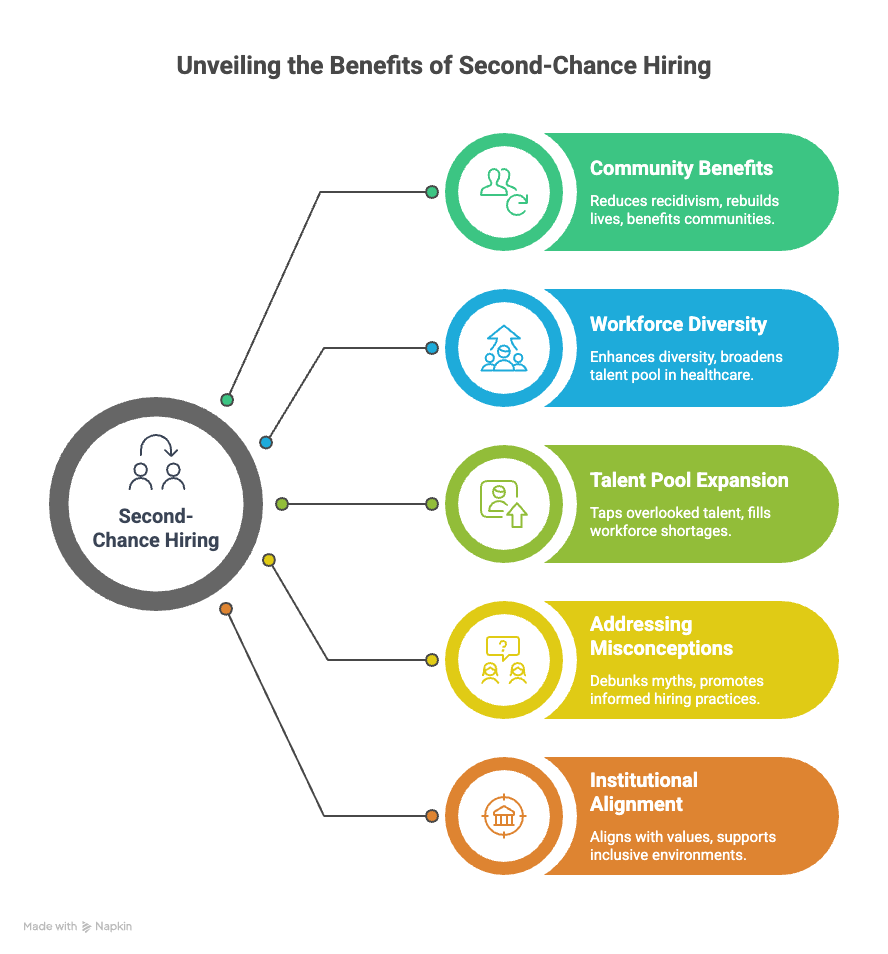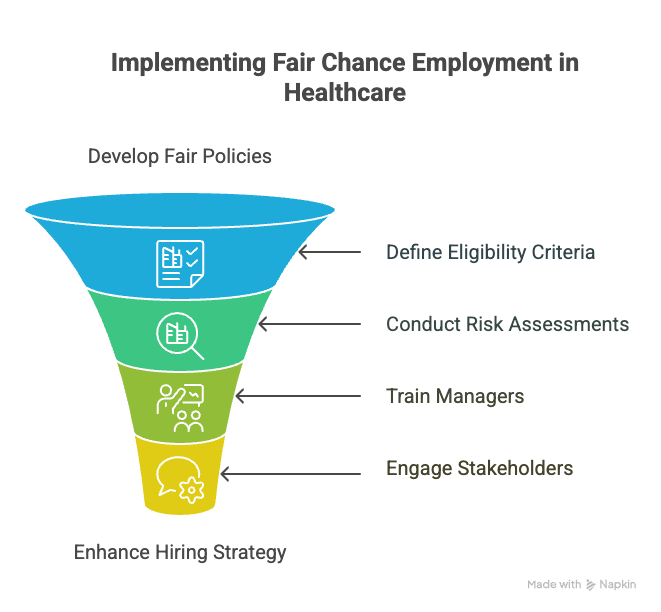Navigating the intricate landscape of hiring in hospitals can be challenging, particularly when striving to balance privacy with second-chance hiring practices. As the healthcare industry continues to face workforce shortages, many hospitals are recognizing the potential of hiring individuals with criminal records who are eager to contribute positively to society. However, this approach requires a delicate balance between safeguarding patient privacy and adhering to stringent compliance protocols.
This comprehensive guide delves into the world of second-chance hiring in healthcare, covering essential aspects such as legal considerations, privacy issues, and the benefits of offering second chances. Through this discussion, we aim to provide valuable insights and practical guidelines for hospitals wanting to hire responsibly while ensuring patient and staff safety.
Key Takeaways
- Workforce shortages in healthcare can be mitigated by considering second-chance hiring, which involves employing individuals with criminal records.
- Integrating second-chance hiring aligns with healthcare values and can enhance team diversity, contributing to improved patient care.
- Understanding legal requirements, such as "ban-the-box" laws, is crucial to ensure compliance and protect candidate privacy during the hiring process.
- Implementing fair chance employment involves developing clear policies, conducting unbiased risk assessments, and training managers.
- Successful examples, like Johns Hopkins Hospital, show that second-chance hiring can fill labor shortages, improve diversity, and reduce recidivism.
Introduction
Hiring in healthcare faces two major hurdles: workforce shortages and the imperative for inclusive employment practices. The demand for healthcare professionals is on the rise, yet the pool of available talent often falls short. Therefore, hospitals must rethink traditional hiring methods and consider opening doors to people with criminal records. This approach taps into an underutilized segment of the workforce, helping fill critical roles.
Second-chance hiring focuses on giving people with past convictions another shot at employment. In healthcare, this practice takes on special importance, aligning with the values of redemption and societal contribution. It's more than just a trendâÂÂit's a necessity for both workforce sustainability and societal progress.
Ensuring patient privacy is non-negotiable in healthcare. When employing individuals with records, the stakes are even higher. Hospitals must walk a fine line, safeguarding sensitive information while adhering to compliance standards. The goal is to foster an environment where privacy is respected, and diverse talent can thrive. As this guide unfolds, you'll gain insights on marrying these objectives for a more inclusive healthcare system.
I live a purposeful life working in HR because I have witnessed how second-chance hiring can transform jobs and life trajectories. Everywhere I have worked with diverse groups, there is one constant: people are greater than their past. Granting a second chance based upon what a person can do rather than what a person has done does more than simply fill a job. It creates a culture enriched with hope, accountability, and development. Health care is primarily about healing, including healing with a job. When we invest in our hiring processes with intention and care, we produce better, more resilient groups resembling our society at large.
Understanding Second-Chance Hiring in Healthcare
Second-chance hiring involves employing individuals with criminal records, giving them an opportunity to reintegrate into society. This approach can significantly benefit communities by reducing recidivism rates and rebuilding lives. In the healthcare sector, where workforce shortages are persistent, this practice can open doors to a broader pool of talent. Hospitals that adopt second-chance hiring can enhance diversity within their teams, bringing in varied perspectives and experiences that improve patient care.
Hiring individuals with criminal records contributes to a more diverse and inclusive work environment. Hospitals can tap into a previously overlooked talent pool, which may include qualified candidates eager to contribute productively. These hires can be particularly valuable in roles where empathy and understanding are essential, as personal life experiences can often translate into compassionate patient care.
Common misconceptions about second-chance hiring include assumptions that individuals with criminal pasts are inherently risky or unreliable. However, studies indicate that when supported properly, these individuals often exhibit strong loyalty and dedication to their employers. Addressing these myths is critical to creating informed, unbiased hiring practices. Real-world examples have shown that with the right support systems in place, second-chance hires can be among the most committed and motivated members of a healthcare team.

As you explore second-chance hiring, consider how it aligns with your institution's values and goals. Are there areas in your workforce that could benefit from the fresh perspectives these individuals bring? What steps can you take to ensure a supportive environment for all employees, regardless of their background? Answering these questions can help hospitals make informed decisions that benefit both their staff and the communities they serve.
Legal Framework and Compliance
Federal and state laws hammer the foundation of second-chance hiring in healthcare. The Fair Chance to Compete for Jobs Act mandates federal agencies to delay asking about criminal history until a job offer is extended. This law sets the tone for broader efforts, encouraging hospitals to evaluate candidates based on skills first.
State laws vary significantly. Many states have "ban-the-box" laws, preventing employers from asking about a criminal record in initial application stages. Knowing the specific regulations in your area is crucial to avoid legal pitfalls.
Integrating privacy and compliance in hiring involves aligning your practices with these laws while ensuring candidate data stays protected. Implement privacy protocols in your hiring process. Limit access to sensitive information and ensure that background checks respect candidate dignity.
Conducting background checks responsibly is non-negotiable. Hospitals need to verify that prospective employees can safely work with vulnerable populations. Yet, the process must respect individuals' rights. Refer to the Department of Labor's guidelines for a comprehensive overview of compliant practices.
Strike a balance between due diligence and respect for privacy. This not only upholds the law but also fosters trust and fairness in your hiring process.
Implementing Fair Chance Employment in Healthcare
Developing clear, fair policies is a critical first step for hospitals aiming to implement second-chance hiring. Begin by defining criteria for eligible candidates. Consider what types of criminal records are relevant to the position and develop guidelines that avoid unnecessary exclusions. Ensure these policies respect both patient and staff privacy while meeting all compliance requirements.
Risk assessment protocols are indispensable. They should evaluate potential risks without introducing bias. Create standardized procedures that provide equal opportunity for candidates with criminal records. This helps in objectively assessing whether a previous conviction could impact job performance or hospital safety. Use case-by-case evaluations to ensure decisions are context-sensitive.
Training managers is another key component. Equip hiring managers with the tools they need to make informed judgments. Host workshops on bias reduction and legal compliance. Knowledgeable managers are better positioned to handle complex hiring situations and can foster a fair culture within your institution.
Engage with stakeholders to fortify your approach to fair chance employment. This includes staff, patients, and community members. Open dialogues can provide valuable input, helping to refine policies and address concerns. By doing so, you affirm your hospital's commitment to equitable hiring practices.

These steps can significantly enhance a hospital's hiring strategy. They provide a structured method for welcoming individuals who deserve the opportunity to reintegrate into the workforce while maintaining the high standards expected in healthcare.
Challenges and Considerations
Meeting the dual goals of rehabilitation and preventing recidivism is a complex task. Hospitals must weigh the chance of reoffending against the potential for rehabilitation. One approach is to carefully assess each candidate's history and context. This means not solely focusing on the past but looking at efforts for changeâÂÂsuch as participation in rehabilitation programs or vocational training.
When it comes to background checks, clarity and ethics come first. The scope of these checks should be relevant to the job role. For example, consider the role's responsibilitiesâÂÂdoes it involve direct patient care? If so, deeper scrutiny might be necessary compared to administrative roles. The idea is not to dig into every crevice but to gather enough information to make an informed decision.
Confidentiality is critical when dealing with applicants with criminal records. Use only necessary data in decision-making processes. It's vital to store and handle this information securely, ensuring that access is limited to those directly involved in hiring. By doing so, you respect the privacy of applicants and build trust within the workforce.
Balancing these elements isnâÂÂt straightforward, but by maintaining a fair approach, you can position your hospital as a forward-thinking employer. How do you plan to integrate these practices into your hiring process?
Benefits and Success Stories
When hospitals embrace second-chance hiring, they often witness transformative benefits. Consider the case of Johns Hopkins Hospital, which successfully integrated second-chance hiring into its workforce strategy. By offering employment to individuals with criminal records, they increased their talent pool and filled critical labor shortages without compromising patient care.
One notable result of these efforts has been a marked improvement in workplace diversity and morale. Employees with diverse backgrounds and experiences contribute unique perspectives and skills, enriching the hospital environment. By fostering an inclusive culture, hospitals can enhance collaboration and innovation among their teams.
In addition to internal benefits, the practice also has broader societal impacts. Integrating second-chance hiring can lead to reduced recidivism rates, as stable employment is a key factor in preventing repeat offenses. Moreover, giving individuals a fair chance at employment contributes to economic uplift in communities, as these workers gain financial stability and contribute to local economies.
Real-world examples like these showcase the tangible advantages of second-chance hiring in healthcare settings. As hospitals continue to explore these opportunities, they not only support their operational needs but also champion significant positive change within their communities.
How to Balance Privacy and Second-Chance Hiring
Best Practices for Hospitals: To maintain a balance between privacy and second-chance hiring, start by implementing secure data handling protocols. Ensure that only pertinent information is collected during background checks and restrict access to sensitive data to essential personnel. Transparency is crucial. Clearly communicate to candidates how their information will be used and stored. This builds trust and encourages open dialogue.
Engaging Stakeholders: Fostering collaboration between hospitals, patients, and the surrounding community can strengthen support for fair hiring practices. Hold forums or workshops to discuss the benefits and address concerns about second-chance hiring. These discussions can dispel myths and highlight the positive impact on hospital culture and community well-being.
Tools and Resources: There are numerous resources available to assist hospitals in implementing balanced hiring practices. Consider consulting organizations that specialize in fair employment, such as the National Employment Law Project. These groups offer materials and training to help align hiring practices with legal and privacy standards. Furthermore, integrating software that ensures compliance with privacy laws can streamline the hiring process without compromising security.
By implementing these strategies, hospitals can navigate the complexities of second-chance hiring while safeguarding privacy, ultimately leading to a more inclusive and diverse workplace.
Conclusion
Fair-chance hiring in hospitals is both a challenge and an opportunity. To strike the right balance, we must focus on transparency and security. Hospitals should create comprehensive policies that clarify the specifics of what is checked and why. This includes understanding the necessary scope of background checks and respecting applicants' privacy.
Effective hiring protocols can mitigate potential risks without relying on assumptions or biases. Training managers is key. Equip them with guidelines that help evaluate candidates based on their potential contributions rather than their past. Clear communication about hiring practices fosters trust and understanding between applicants and the hiring teams.
Engagement beyond the hospital walls is crucial. By involving patients, staff, and local communities in conversations about fair-chance employment, hospitals can build a more inclusive environment. Open dialogue helps demystify fears and promotes a culture of acceptance.
Resources and tools are available to assist in this journey. Secure data systems protect sensitive information, and workshops and seminars can bolster awareness and skills. By focusing on these elements, hospitals not only expand their talent pool but also enhance their contribution to societal well-being.
Frequently Asked Questions (FAQs)
Can hospitals hire someone with a criminal record?
Yes, hospitals can hire individuals with a criminal record. Decisions depend on factors like the nature of the crime, the time elapsed since the offense, and its relevance to the job role.
What roles are appropriate for second-chance hiring in healthcare?
Roles that don't involve direct patient care can be suitable, such as administrative positions, cleaning staff, and support roles. The severity and type of past offenses will influence job suitability.
How do hospitals protect patient privacy during background checks?
Hospitals comply with privacy laws, ensuring that background checks are conducted by authorized personnel. Information obtained is used only for the decision-making process and is kept confidential.
What does the EEOC say about second-chance hiring in hospitals?
The EEOC encourages considering individuals for employment based on their qualifications rather than solely on past criminal records. They recommend considering the nature of the crime, the time elapsed, and its relevance to the job.
Is it legal to deny a healthcare job based on a conviction?
Yes, it is legal if the conviction is relevant to the job role or poses a risk to patients or staff. However, decisions should be consistent with anti-discrimination laws and made on a case-by-case basis.
How can hospitals mitigate risks when hiring someone with a criminal record?
Hospitals can conduct thorough background checks and assess the relevance of the criminal record to the role. Implementing probationary periods and continuous performance evaluations can also help.
What support mechanisms can hospitals provide to employees with a criminal record?
Hospitals can offer mentorship programs, training, and access to counseling services. This support helps employees adjust and succeed in their roles.
How does the hiring of individuals with criminal records impact hospital culture?
Hiring individuals with criminal records can promote a culture of inclusivity and diversity. It can positively impact the workplace by demonstrating a commitment to rehabilitation and equal opportunities.
What are the potential benefits of second-chance hiring for hospitals?
Second-chance hiring can address labor shortages, reduce recruitment costs, and enhance community reputation. It provides access to a broader talent pool and supports social responsibility initiatives.
Definitions
Second-Chance Hiring
Second-chance hiring refers to offering jobs to individuals who have criminal records. In healthcare, this practice helps expand the available talent pool and supports workforce needs. Candidates are evaluated not just by their past but by what they can contribute. Employers may look at rehabilitation efforts, work history, or job-relevant skills. This hiring method can reduce recidivism and promote community stability.
Fair Chance Employment
Fair chance employment focuses on giving all job seekers, including those with criminal convictions, a level playing field. Policies often delay background checks until after a job offer. This approach emphasizes merit over history. Employers assess candidates on qualifications first, removing early-stage barriers that might lead to bias.
Risk Assessment
Risk assessment in hiring is the process of evaluating whether a candidateâÂÂs criminal history relates directly to the job role. For example, a history of financial crimes might be more relevant to a billing role than a maintenance job. Hospitals create clear protocols for this process to ensure fairness. They review each candidateâÂÂs background individually instead of applying blanket exclusions.
Background Checks
A background check involves verifying a candidateâÂÂs criminal record, employment history, or education. In healthcare, it can also confirm whether someone is eligible to work around patients. The check should relate to the jobâÂÂs responsibilities and only include the data needed for the decision. Too much or irrelevant information can lead to bias and privacy issues.
Inclusive Hiring Practices
Inclusive hiring practices aim to reduce bias and increase diversity in the workplace. This includes removing unnecessary barriers and considering candidates from all backgrounds. In healthcare, it means being open to applicants with varied life experiences. Teams built through inclusive hiring often reflect the communities they serve, improving trust and care quality.
References
- https://www.richmondfed.org/region_communities/regional_data_analysis/regional_matters/2022/rm_07_29_2022_second_chance_hiring
- https://www.uschamber.com/workforce/data-deep-dive-the-workforce-impact-of-second-chance-hiring-3
- https://mitsloan.mit.edu/ideas-made-to-matter/bottom-line-benefits-second-chance-hiring
- https://csgjusticecenter.org/publications/expanding-access-to-health-care-jobs-for-workers-with-criminal-histories/
- https://aspe.hhs.gov/sites/default/files/private/pdf/259686/MeetingtheDemand.pdf

GCheck Editorial Team
Meet the GCheck Editorial Team, your trusted source for insightful and up-to-date information in the world of employment background checks. Committed to delivering the latest trends, best practices, and industry insights, our team is dedicated to keeping you informed.
With a passion for ensuring accuracy, compliance, and efficiency in background screening, we are your go-to experts in the field. Stay tuned for our comprehensive articles, guides, and analysis, designed to empower businesses and individuals with the knowledge they need to make informed decisions.
At GCheck, we're here to guide you through the complexities of background checks, every step of the way.






